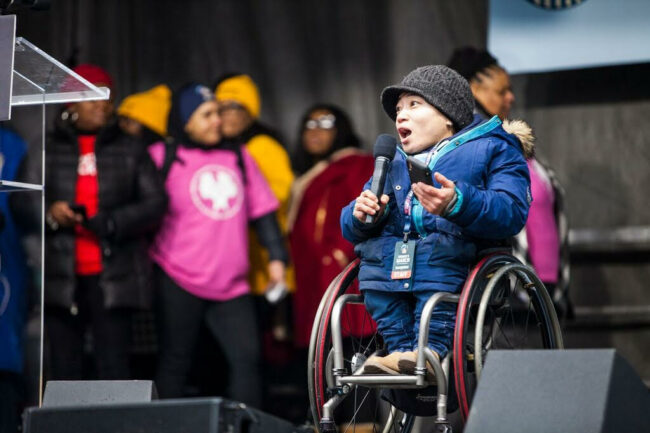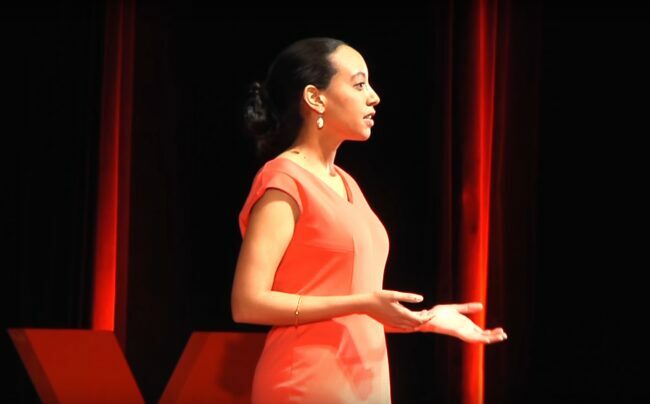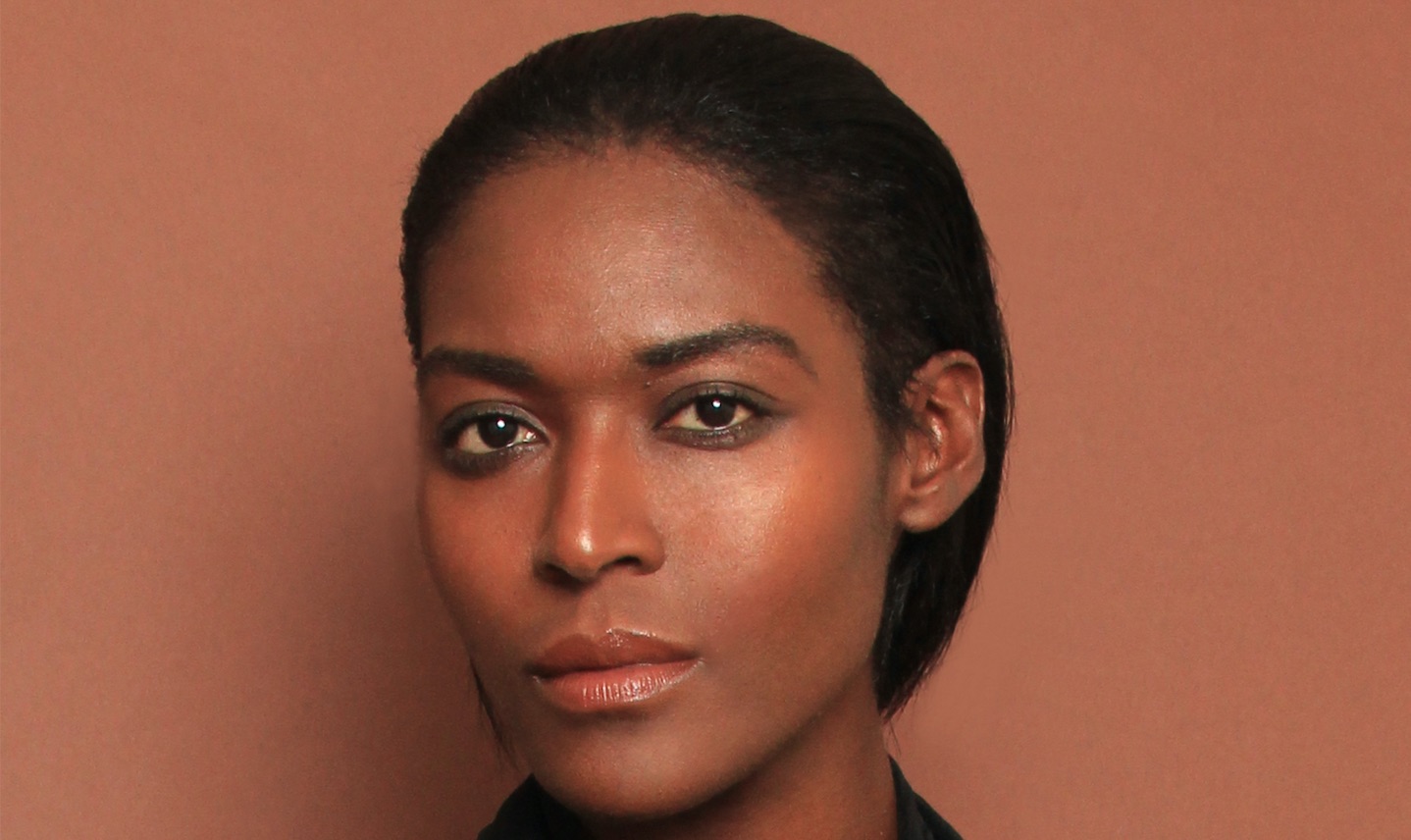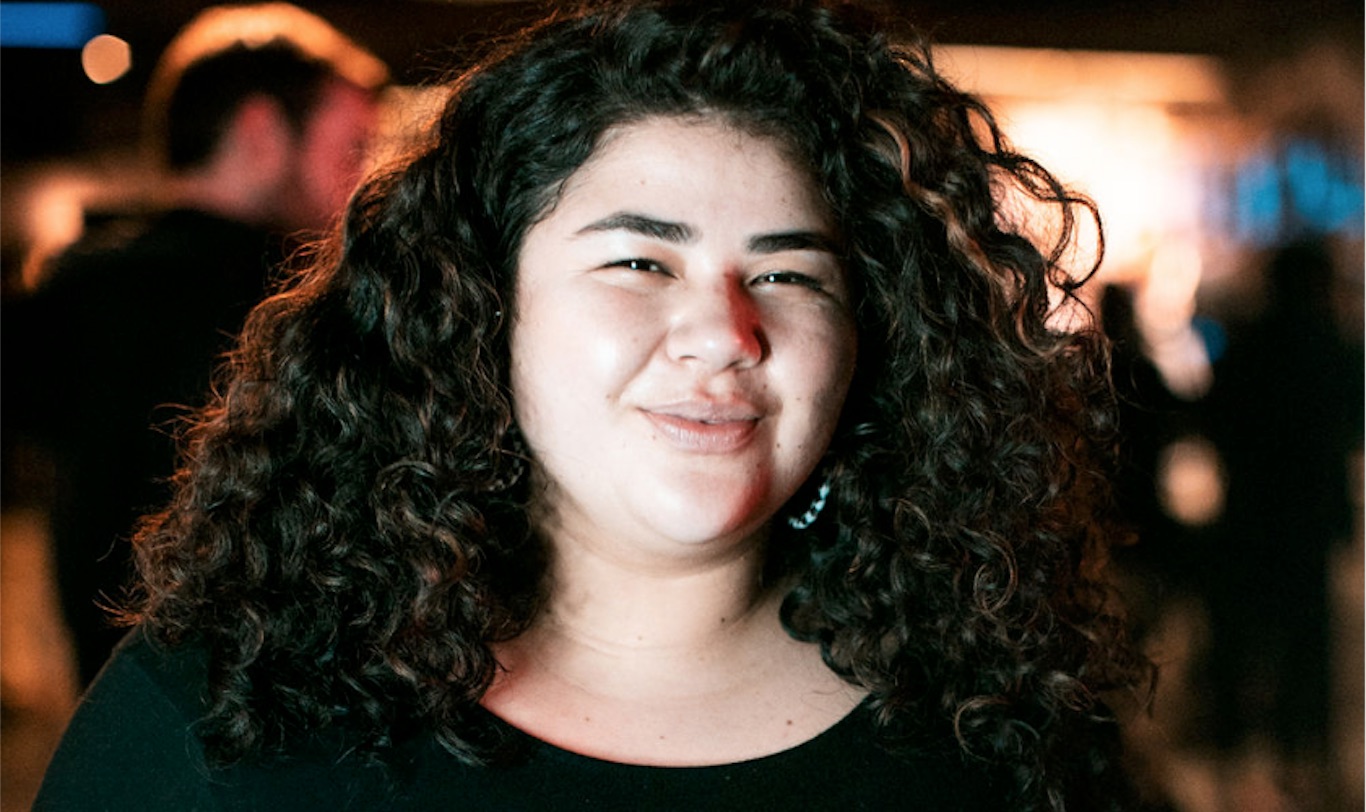
This article is part of an exciting series we launched in 2018 called Today’s Wonder Women – designed to celebrate the inspiring, impactful, empowering and extraordinary things ordinary women are doingevery day. Over the coming months we will be sharing interviews, essays, articles and guest posts about women who are creating change. If you have a story to share and want to add your voice to the Today’s Wonder Women conversation, get in touch by emailing info@girltalkhq.com.
Some of the best and most effective social changes are made by people who see a gap or an unmet need and resolve to fill it, rather than waiting for someone else to take up the mantle. One of these people is Dan Owens-Reid (who also goes by Dannielle) – an author, speaker, and CEO of a gender-fluid clothing marketplace and inclusion consulting agency called Radimo. Many people in the LGBTQ community as well as allies may already be familiar with Dan’s earlier work as she experienced viral fame via the blog she started in 2010 called “Lesbians Who Look Like Justin Bieber” which led to the opportunity for her to run social media for Virgin Mobile on tour with Lady Gaga and co-founding the LGBTQ youth organization, Everyone is Gay. EIG also became a highly successful Youtube channel which tackled LGBTQ subjects and enabled parents and youth to utilize the content as a helpful tool for conversation and destigmatization.
Although Dan’s career has evolved over the years and seen a number of successful projects, her underlying mission is the same – to give visibility to the LGBTQ community in a way that is educational, diverse and inclusive. With the focus on representing LGBTQ and disabled talent, Dan’s passion to see social change in entertainment and fashion come at a time when it is more important than ever. We have seen so many social and political gains in society, but with that has also come a lot of backlash and people expressing their lack of understanding and discomfort in unhealthy ways toward the LGBTQ and disabled communities for seeking equality.
Dan doesn’t allow the negativity to stop or derail her passion for her work. Committed to fostering conversations about gender through her projects, her focus and determination give us hope. It’s easy to find and focus on the problems, and another to amplify the work of those creating solutions. She is an effective and consistent change-maker we can learn so much from and be inspired by at the same time.

First let’s talk about your talent management company – how did you come up with the idea and why did you feel it was important to launch this?
I kind of fell into it. I was writing for my first client (and close friend) Stevie Boebi. She needed additional help with negotiations / timing / organization. She was recently diagnosed Ehler’s Danlos Syndrome – a chronic illness with many varied symptoms some of which are cognitive, so my skills were of great help to her. She had all the negotiation / brand smarts and I’ve been in social media & business for nearly a decade. We made a perfect match. She is the one who taught me that no one should have to work without at least some of their payment up front. And no influencer should only be given the option to work on affiliate. These people pay for marketing on billboards or facebook ads, and this is no different. I wanted to protect her and get her what she deserved and boom a manager was born!
After about a year of working with her, my good friend Jimanekia approached me about management. My goal with both of them was to protect them and get them what they deserve as creators. My focus has always being on those in marginalized communities. I saw outright how a brand would offer my white client more money than one of my black clients with the same size following. Because I managed them both, that was literally unacceptable and I could lay out for the brand exactly what they were doing. In so many cases with my clients, because they’re women, queer, trans, black, disabled, plus size, whatever the reason, people will try to mess with them and me stepping in with my white man-sounding name changes the conversation. It’s time for brands, companies, and society to stop taking advantage of femmes in marginalized communities and I’m committed to making sure there is progress being made.

What is your selection process for new talent?
I have to be obsessed with their work whether it’s a performer, an educator, or an influencer. We talk all day every day, I need to be able to call them out for not following their dreams and they need to know that listening to me is the best thing they can possibly do for their careers. I’m not an agent who is out getting jobs that might fit them. I’m motivating them, talking them through turning down major jobs, and convincing them to change their entire career path. It’s wild and really cool. Sometimes they’ll see what I’ve done for someone else and reach out, sometimes I’ll beg them for months and months to let me manage them.
Why is it important to you personally to see more queer, trans, black, POC, women, and disabled creators represented in public spaces?
When I enter a room, event, workspace, etc., and everyone I lay eyes on is cis, white, hetero, able-bodied, I feel really uncomfortable. I immediately start to panic about what pronouns to use and what aspect of my work to talk about. I grew up poor and most of the white families in my town were very affluent. The white kids thought I was weird and made fun of me, the black kids thought I was funny and were always super nice to me. I think this stuck with me and kind of wired my brain to believe that if there are plenty of people around who all look different, then the room is safe and I’ll find a friend. If I’m in a room where everyone looks exactly the same, they probably won’t like me.
That wasn’t something I consciously understood at the time, or even well into my adulthood, but it stuck with me on some level because now I feel myself fall completely silent at events that are populated by all cis / white / het folks. And I’m WHITE! With visible disabilities! I’ve worked in many different fields that were meant to be “safe spaces” and at the end of the day still prioritized white creators over everyone else. That’s not a safe space, that’s not progress, and so many businesses / brands / organizations have access to the funds and creative to make their spaces and work safe and inclusive. They CAN do this work, they CAN increase the representation. The decision not to do so is an active one and there’s no just reason for it.

Aside from talent management, you also created a brand called Radimo, which is described as “a gender-fluid clothing brand and inclusive marketplace dedicated to challenging the traditional standards of fashion and shopping.” What kind of items of clothing does it include?
Everything! Shirts, Shoes, Dresses, Skirts, Shorts, Make Up, Wellness products, Earrings, Pendants. Clothing is inherently genderfluid in my opinion, so we get to carry literally everything.
We also host brands and products from queer, trans, POC, black, non-binary, disabled, plus size, and women-owned businesses and designers. Every item in the store is photographed on at least three different body types, skin tones, and gender expressions. Giving so many of us the opportunity to FINALLY see ourselves reflected in fashion and throughout our entire shopping experience. And the ability to support brands and designers from our own communities.
You’ve talked about how you never felt comfortable with fashion growing up as someone who identities as gender fluid. How can fashion play a powerful role in the self-esteem of someone, especially someone who feels like they don’t belong?
It is so so important. Even for someone who isn’t into fashion, like myself, having the ability to wear whatever you want, present however you want, be seen however you want, it’s life-changing.
I discovered so much about my relationships with my own gender through clothing. I’ve always hated dresses, I’ve always hated suits. I’ve always wanted something in the middle, but never had the words (or the clothing) to figure out what that meant, or what other options I had. For so long I hated my body because I thought that’s what made me feminine, I thought my body was working against me, my body is what made me ‘ugly’, my body is what made people treat me differently, my body forced me to look differently than how I wanted to look. But once I started to dress differently – wearing clothes from both the men’s and the women’s section – once I started to carry myself differently, changed my hair, changed the people I hung out with, etc., I started being seen as genderqueer and began to love my body in a whole new way.
I present pretty androgynous, people never know whether to say ‘sir’ or ‘ma’am’ and that’s exactly what I want. That’s what makes me feel most seen. It had a lot to do with my dress and it had a lot to do with the people I surrounded myself with.

I love that we are seeing so much disruption in the fashion world right now with models like Hari Nef, Rain Dove, Andreja Pejic and more. Do you think brands and stores are starting to pay attention to this disruption?
I think they’re trying, but most of them aren’t getting consultants or hiring creators from the community and it shows. I love the models you listed, but they’re all white or at least white passing. It doesn’t start and stop with gender. It’s of course an incredible step, but at the end of the day big brands make decisions based on money. If their lack of inclusivity effects their bank accounts then they do what they can to change. Oftentimes they scramble with no direction and just try to plop in something that seems like it’ll work. People don’t realize that by expanding who you represent, you’re expanding your customer base.
We hardly seem to see many disabled models in the mainstream. Why do you think that is, and how do you hope to change this?
I think there are as many disabled models in the mainstream as there are black plus size trans models. Virtually none. And the reason is because when designers are putting clothes on the runway, they want it to look exactly as the clothes would look on a hanger. Having someone extremely thin and extremely pale who can walk quickly and in a straight line is what they care about. They don’t want you to know what their clothes will look like on real people, so they don’t cast real people as models. There’s a ‘reason’ for every decision every designer and brand makes. It’s just that the reason has never been “because we want it to be inclusive and we believe every deserves to be represented in fashion.”
People don’t hire disabled models because in their mind, that is a limited experience. They believe there aren’t many disabled people in the world (FALSE), they believe not many of them care about fashion (FALSE), and they believe that of the disabled folks who care about fashion, not many of them will buy the clothes anyway (FALSE). If you want to know what disabled POC think about fashion, ask them. Brands will be blown away by reality if they just ask.
I carry crop tops and sweatshirts up to 6x and I was told by so many people it was admirable but the plus sizes were never going to sell. I can show you the orders – it’s about 50/50 straight sizes vs 2X and above.

You have been working in the LGBTQ space for many years now and this is clearly a passion of yours. You used to run the ‘Everyone is Gay’ Youtube channel with your former co-creator, which became a resource for parents wanting to talk about gender issues with their kids. And you are the co-author of ‘This Is A Book For Parents of Gay Kids’. Was this educational and support aspect of your work something you always envisioned doing?
Not really. My dad says even since I was a kid, I’ve always cared about what’s fair. But I didn’t even realize that was the case until he said it. I’ve always said I don’t like being an activist. I think this comes from the fact that I don’t like being forced to talk with people who don’t agree with me and putting energy into trying to force their opinions to change really stresses me out. I absolutely love giving advice and I love motivating people to know that you can just love each other. And that’s how my last business started. I created the ‘Lesbians Who Look Like Justin Bieber’ blog for laughs and almost immediately people were asking me really deep questions. I used to call it accidental activism because I never thought of myself as an activist simply for telling a parent that it’s cool to still love your gay kid. People were so confused because their church or pastor or whoever told them “no you can’t love your gay kid”, but these parents truly felt like they still did. They were lost and it didn’t feel like education or support or progress for me to just say “ok, so what if you just love your kid anyway” – it just felt right. And I like doing what’s right.
Are you encouraged to see more parents wanting to talk about gender identity with their kids in this generation?
Absolutely. It’s really cool. So many parents don’t know what to say or how to talk, but they know they love their kid and they want to support them. They just say ‘ok’ when their kid changes name or pronouns. They just drive them to the mall and go into whatever store their kid wants to go into. They send me emails asking for advice on gender neutral shopping. I can guarantee that means the world to their kids. I always say there are two types of parents (1) parents who don’t care and (2) parents who try. It’s not possible to know or do everything right, but it’s possible to try and your kid notices the difference.

Gender identity is a very big topic and can often be used as a way to divide people politically (“identity politics”). How do we bring this down to a more personal conversation and make it more inclusive?
I never believe that someone should have to defend their identity. If you want someone to use different pronouns and that person argues with you, suggests it’s political, complains that it’s too hard, etc., it becomes so emotionally taxing and draining that it makes you want to give up on being yourself. Anytime someone asks me the best way to defend their identity to someone who disagrees, I tell them to stop fucking with that person and instead spend energy on the people who are making an effort and respecting who you are. I think if we focus our energy on the friends, family, businesses that are making the effort we will see ourselves thrive on a personal and global level.
The consulting that I do with brands, corporations, and influencers focuses on just that. I facilitate the workshop, but I am not the only consultant. I bring in 5-7 additional consultants from all different backgrounds – race, body type, disability, gender – their life experiences are different from mine and together we build programs with the brand to make their business, products, online, and overall brand messaging completely inclusive.
“Identity politics” is just someone’s way of saying “I don’t want to respect you so I won’t.” To that I say… ok! Bye!And then I move on to someone who does respect me and my day is better!

Where do you see yourself in 5 and 10 years?
I’m looking forward to having a massive office with multiple managers. All of whom have the same goals and mission as I do. I would love to have a giant space that makes it easier for the talent to create. Access to office space / equipment / materials / lunch for the day / creative sounding board, whatever they may need to prioritize their creativity. I want Radimo to explode and represent hundreds of queer, trans, poc, indigenous, black, disabled, and women business owners. I love hosting a place where we can directly support brands that are run by people who look like us. I want to bring my consultants in to talk to every major brand there is – we can make massive change from the inside.
And finally, what makes you a powerful woman?
I think being a powerful woman is moving past everything society has taught you, and moving past what society has taught everyone else about you, and being unapologetic. Being a powerful woman to me was about dropping every single idea I had about women. Dropping every single idea I had about who I needed to be. Dropping every single expectation I had. I expected to settle for a love that wasn’t good enough. I expected to settle for a job that made me miserable. I expected to settle because I was always shown garbage. I feel like I grew up understanding I just had to be sad and I had to be less powerful.
As soon as I knew my gender was up to me and my career was up to me and my partner was up to me, that’s when I felt powerful. I’m a powerful woman because I saw what society gave me and said “No thanks! I’ll be doing this my own way.”


















2 thoughts on “Talent Manager & “Accidental Activist” Dan Owens-Reid On Making Creative Industries More Inclusive For Minorities”